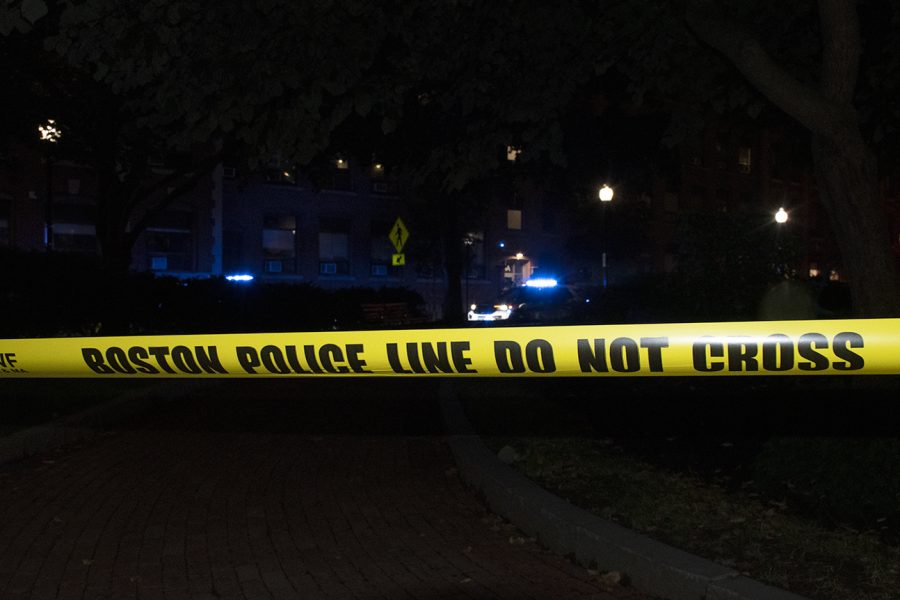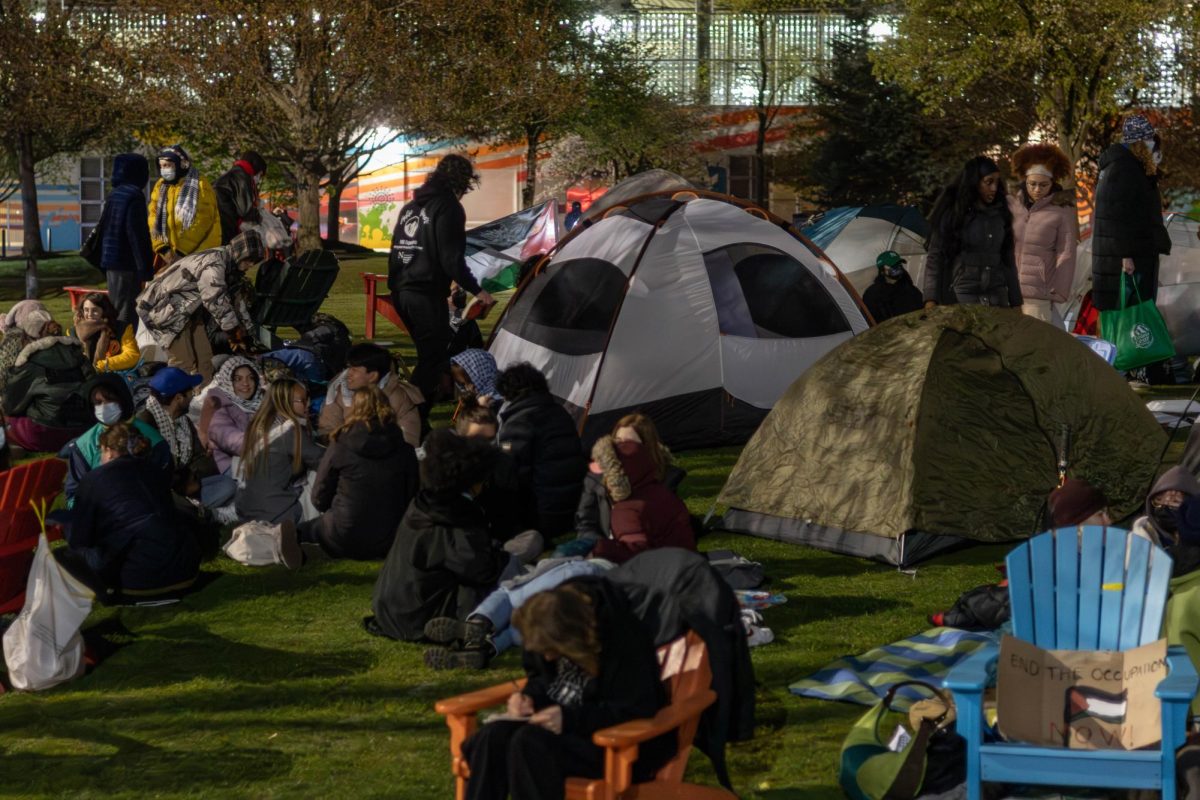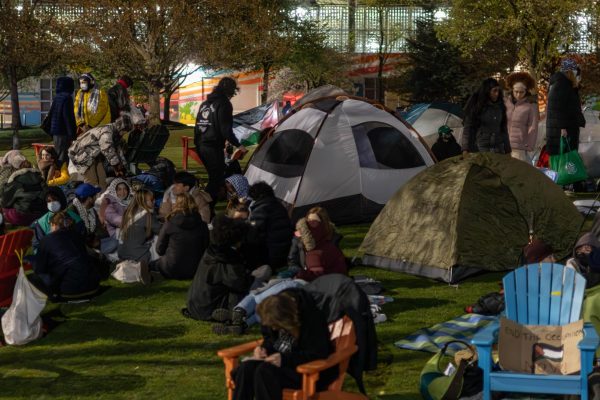Students react to Holmes Hall detonation, evaluate campus safety
Students leaving Holmes Hall Sept. 13 evening found the building surrounded by police officers and bomb squad members following an explosion of a pelican case in Northeastern’s virtual reality lab.
September 26, 2022
Northeastern students’ lives have mostly returned to normal following an on-campus package detonation, but some are still questioning what exactly happened and why the administration has seemingly moved on.
At around 7:18 p.m. Sept. 13, a pelican case in Northeastern’s virtual reality lab located in Holmes Hall depressurized, causing minor injuries to Jason Duhaime, the virtual reality program’s new technology manager, according to The Boston Globe. The university evacuated students in the building and in other surrounding areas and canceled all remaining evening classes. A note claiming the university has ties to Mark Zuckerberg, robots and the U.S. government was found with the case.
The explosion is now being investigated as a potential hoax, but there has been no clear answer regarding a motive or who is responsible. This uncertainty has left some students wondering about the university’s response.
“The biggest thing that sat with me afterwards was that we got more information about what happened from [both local and national news outlets] than from Northeastern, and I think a lot of people have been saying that,” said Madison Neuner, a fourth-year journalism and communication studies combined major.
Neuner was in their first photojournalism class of the semester in Holmes Hall when the incident occurred. A fire alarm went off in the building, but the professor and students did not immediately decide to leave, given that fire alarms are accidentally set off frequently. Neuner said that this did not feel “strange” to them. It was not until the professor saw that the other class in the building was leaving that they realized they had to evacuate.
“When you walk out of the building, you immediately see all of the police cars, you see the bomb squad, you see the the fire truck with a giant ladder going up to the building, so we knew that something was going on,” Neuner said. “It wasn’t just a drill. It wasn’t just a tiny little thing.”
Neuner said their class pulled out their phones and cameras to take pictures, noting that there was a sense of “positive energy” in the photojournalism class. Soon after, police expanded the perimeter, restricting students’ access to the area.
The class continued in an empty classroom in West Village G. Neuner eventually stepped out of class to accept a phone call from their mom and stayed at a cross country teammate’s residence for the night.
Neuner said that, after talking to their teammates, they realized students who had not been in the area of the incident did not know what was going on.
“We saw the scene developing over that period of time, and we knew more than everyone else did at that time, because Northeastern didn’t send out a communication until 40 minutes or so after the fire alarm went off in our building,” Neuner said. “So everyone else didn’t even know it was happening until 40 minutes afterwards.”
Northeastern sent out the first alert at 7:55 p.m., which said “emergency services [were] responding to an incident at Holmes Hall” and asked students to “avoid the area during the investigation.” Neuner questioned the university’s long response time and the lack of information distributed to the students.
“Northeastern’s communication was vague to a point where it wasn’t helpful,” Neuner said. “And I think it did just make people more scared, confused, nervous and probably a little bit angry, to be honest.”
They also criticized the university’s decision to resume classes the next day. Their friend had an 8 a.m. class, which Neuner noted was a little more than 12 hours after the explosion had occurred.
“Continuing class at a normal rate as if everything was normal less than a day after that happened was kind of crazy,” Neuner said. “I don’t have classes on Wednesdays, so for me I got the chance to just sit and kind of digest what happened and also be removed from it, but a lot of people didn’t get that opportunity to sit with themselves and do a mental check in about how they were feeling about what was going on.”
Other students who spoke with The News felt that Northeastern did the best it could given the circumstances. Alex Buckley, a third-year political science and journalism combined major who was also in the photojournalism class that night, said, though Northeastern’s response was not perfect, it did not put anyone at serious risk.
“I suppose it wasn’t ideal. They could have sent a notice for people to just avoid that part of campus,” Buckley said. “At the same time, the police [had] literally cordoned off that part of campus, so it’s not like anyone was at risk of accidentally tripping on the bomb.”
He said that, when he got outside, students in the surrounding dorms were shouting from their windows, trying to ask the class and the police what had happened. None of these students seemed visibly scared or upset, he said, just curious.
Buckley said he assumed the second email the university sent out, with a subject line that included “Explosion 2,” was an unfortunate mistake.
“I’m guessing someone forgot to change it in the draft,” Buckley said. “So that was pretty funny.”
He said that students cannot expect the university to communicate everything in the first bit of time following the incident, as the administration does not always have all the answers. He added that, in his three years on campus, he has typically felt it is a safe environment.
“Some areas in the vicinity of campus can be seedy, especially at night. Personally, I haven’t had any incidents, and I don’t have any friends who had any bad incidents,” Buckley said. “So you know, it’s a city school, right? You’re in a city. There are lots of people here. There are going to be some not so great people. Overall, I generally feel pretty safe on campus.”
Ryan Gehrlein, a fourth-year computer science and game development combined major who worked alongside Duhaime for a game studio course in 2020, found the coverage of the detonation troubling.
“I’m mixed about his name officially being out now that everyone is spreading rumors that the event was … staged,” Gehrlein said. “When I took the game studio course in fall 2020 we were working with VR headsets, and so I was in the lab with him and other students on weeknights doing work.”
Gehrlein described Duhaime as passionate about his work in virtual reality and excited to assist Gehrlein with his project.
Like Neuner, Gehrlein was left in the dark about the nature of the emergency messages from the university. Officials evacuated Gehrlein’s roommates from their West Village residence, but many students were left wandering campus with questions unanswered. Gehrlein said some security guards seemed as unsure of the protocol as students.
“[My roommate] told me she asked a few guards where she could go as a detour since they roped off a big area right around West Village E, and they just shrugged her off,” Gehrlein said. “I went outside to take a picture of the area, after which she went around and made it into Ruggles street … Funny enough, after I went out to take a picture, a security guard came from behind and told me to ‘pick a direction and keep walking,’ so I went back inside.”
Although Gehrlein said he was disappointed in Northeastern’s communication with students, he understands why the university prioritized securing the area around the detonation first, he said. Still, Gehrlein said the lack of communication could have been potentially dangerous.
“The fact that they sent out an email titled ‘Explosion 2’ would be funny if it didn’t make it much more stressful for people and also helped feed into misinformation about there being more bombs,” Gehrlein said. “Overall, though, I feel like they handled the situation fairly well in terms of securing the area, but they absolutely need to communicate with people on campus about what is happening, because I feel they could have put people in danger with the way they handled that aspect of this situation.”
Following the incident, students have attempted to return to normal, but some who spoke with The News are still reflecting on how close-to-home the alleged explosion took place.
“Obviously you don’t want this to happen anywhere, but of all the places this could have happened of course it happened in my college in a building that I was in, taking a normal class on a normal day,” Neuner said. “Of course this happens right next to me.”


















